Welcome to DU!
The truly grassroots left-of-center political community where regular people, not algorithms, drive the discussions and set the standards.
Join the community:
Create a free account
Support DU (and get rid of ads!):
Become a Star Member
Latest Breaking News
General Discussion
The DU Lounge
All Forums
Issue Forums
Culture Forums
Alliance Forums
Region Forums
Support Forums
Help & Search
Celerity
Celerity's Journal
Celerity's Journal
May 10, 2024

https://prospect.org/blogs-and-newsletters/tap/2024-05-09-aid-to-israel-conditional/

Displaced Palestinians arrive in central Gaza after fleeing from the southern Gaza city of Rafah in Deir al Balah, Gaza Strip, May 9, 2024.
President Biden’s better-late-than-never and better-partial-than-nothing-at-all decision to withhold U.S. bombs and shells from Israel should it mount an all-out attack on Rafah at least shows that his administration can have the ability to walk its talk. Biden’s talk has been replete with before-the-fact advice to the Netanyahu government not to utterly destroy Gaza in its war on Hamas, and after-the-fact statements of regret and condemnation as Israel has persisted in doing just that. Until the past couple of weeks, however, Biden didn’t really draw a line that he said Israel should not cross, and that line was Israel assaulting the million Palestinian refugees huddled in Rafah because there was no place left to go—at least, no place in Gaza where buildings still stood.
Until yesterday, Biden had acted as if drawing any lines that conditioned U.S. aid to Israel was without precedent, if not un-American. That ignored a host of precedents in which American presidents did just that, including Dwight Eisenhower’s order to Israel to cease its offensive against Egyptian forces at the Suez Canal, and Ronald Reagan’s order to Israel to stop its invasion of Lebanon. Those orders came down, moreover, when Israel’s government did not yet include fanatical, messianic bigots as its current cabinet does, and when the country’s prime minister was not determined to keep the war going as a way to forestall the fall of his government and his ensuing criminal prosecution on unrelated charges, which is certainly at the root of Bibi’s determination to keep the war going today. More broadly, however, the U.S. has conducted much of its Middle Eastern policy over the past two decades as if it were still dealing with an Israeli government headed by Yitzhak Rabin—the onetime Israeli general who, as prime minister, signed the Oslo Accords and began work on the two-state solution the accords set out.
Shortly after he’d embarked on that process, of course, Rabin was assassinated by an ultranationalist, and for most of the past two decades, such ultranationalists, represented disproportionately among the West Bank settlers, have set de facto Israeli policy, even when a majority of Israelis overall opposed them (as in the controversy over the powers of Israel’s Supreme Court). Desperate to cling to power rather than go to the clink, Bibi sought and won the ultras’ support in order to have a parliamentary majority, placing the most ultra of the ultras in his cabinet, where they’ve demanded the devastation of Gaza and backed anti-Palestinian pogroms in the West Bank. One might expect that the Biden administration might have reconsidered its position of unconditional aid to an Israel so governed. (That Donald Trump, when president, clearly favored the rise of ultranationalists in the Israeli government should have been a warning sign that a government so attractive to violent authoritarians might not fully merit our embrace.)
Now that Biden has finally found a line that Israel can cross only by forfeiting a measure of U.S. aid, however, there remain other lines that Israel crosses every day. We can still provide Israel with antimissile defenses (and we should) and at the same time withhold other aid so long as Israel continues to foster famine in Gaza and turns a blind eye to the rising settler violence against Palestinians in the West Bank. More broadly, since America’s baseline position in our Middle Eastern policy is support for a two-state solution, it’s hard to see why active adherence to such a policy, which Israel once pledged to support and which Bibi has officially rejected, should not be the chief condition on which our support for Israel is based. And not just lip-service adherence, but the active removal of Israeli settlements from the West Bank. The demands of both realpolitik and democratic values don’t often coincide, but they do come together, albeit with some jostling, in the two-state policy. If flouting such a policy isn’t grounds for withholding American aid, what on earth is?
snip
Looks Like Aid to Israel Can Be Conditional After All

https://prospect.org/blogs-and-newsletters/tap/2024-05-09-aid-to-israel-conditional/

Displaced Palestinians arrive in central Gaza after fleeing from the southern Gaza city of Rafah in Deir al Balah, Gaza Strip, May 9, 2024.
President Biden’s better-late-than-never and better-partial-than-nothing-at-all decision to withhold U.S. bombs and shells from Israel should it mount an all-out attack on Rafah at least shows that his administration can have the ability to walk its talk. Biden’s talk has been replete with before-the-fact advice to the Netanyahu government not to utterly destroy Gaza in its war on Hamas, and after-the-fact statements of regret and condemnation as Israel has persisted in doing just that. Until the past couple of weeks, however, Biden didn’t really draw a line that he said Israel should not cross, and that line was Israel assaulting the million Palestinian refugees huddled in Rafah because there was no place left to go—at least, no place in Gaza where buildings still stood.
Until yesterday, Biden had acted as if drawing any lines that conditioned U.S. aid to Israel was without precedent, if not un-American. That ignored a host of precedents in which American presidents did just that, including Dwight Eisenhower’s order to Israel to cease its offensive against Egyptian forces at the Suez Canal, and Ronald Reagan’s order to Israel to stop its invasion of Lebanon. Those orders came down, moreover, when Israel’s government did not yet include fanatical, messianic bigots as its current cabinet does, and when the country’s prime minister was not determined to keep the war going as a way to forestall the fall of his government and his ensuing criminal prosecution on unrelated charges, which is certainly at the root of Bibi’s determination to keep the war going today. More broadly, however, the U.S. has conducted much of its Middle Eastern policy over the past two decades as if it were still dealing with an Israeli government headed by Yitzhak Rabin—the onetime Israeli general who, as prime minister, signed the Oslo Accords and began work on the two-state solution the accords set out.
Shortly after he’d embarked on that process, of course, Rabin was assassinated by an ultranationalist, and for most of the past two decades, such ultranationalists, represented disproportionately among the West Bank settlers, have set de facto Israeli policy, even when a majority of Israelis overall opposed them (as in the controversy over the powers of Israel’s Supreme Court). Desperate to cling to power rather than go to the clink, Bibi sought and won the ultras’ support in order to have a parliamentary majority, placing the most ultra of the ultras in his cabinet, where they’ve demanded the devastation of Gaza and backed anti-Palestinian pogroms in the West Bank. One might expect that the Biden administration might have reconsidered its position of unconditional aid to an Israel so governed. (That Donald Trump, when president, clearly favored the rise of ultranationalists in the Israeli government should have been a warning sign that a government so attractive to violent authoritarians might not fully merit our embrace.)
Now that Biden has finally found a line that Israel can cross only by forfeiting a measure of U.S. aid, however, there remain other lines that Israel crosses every day. We can still provide Israel with antimissile defenses (and we should) and at the same time withhold other aid so long as Israel continues to foster famine in Gaza and turns a blind eye to the rising settler violence against Palestinians in the West Bank. More broadly, since America’s baseline position in our Middle Eastern policy is support for a two-state solution, it’s hard to see why active adherence to such a policy, which Israel once pledged to support and which Bibi has officially rejected, should not be the chief condition on which our support for Israel is based. And not just lip-service adherence, but the active removal of Israeli settlements from the West Bank. The demands of both realpolitik and democratic values don’t often coincide, but they do come together, albeit with some jostling, in the two-state policy. If flouting such a policy isn’t grounds for withholding American aid, what on earth is?
snip
May 9, 2024

As El Fasher stands on the ‘precipice of a massacre’, rights groups call for sanctions after new testimony describes atrocities carried out by RSF paramilitaries in Sudan
https://www.theguardian.com/world/article/2024/may/09/darfur-atrocities-ethnic-cleansing-human-rights-watch-report-rsf-sudan

Refugees wait for a food distribution point to open at a camp in Adré, Chad, on 22 April. More than 8 million people have been displaced since fighting erupted between the RSF and Sudan’s military in April 2023. Photograph: Dan Kitwood/Getty Images
Gruesome new testimony details one of the worst atrocities of the year-long Sudanese civil war – the large-scale massacre of civilians as they desperately tried to flee an ethnic rampage in Darfur last summer. Witnesses describe children, still alive, being “piled up and shot” by the paramilitary Rapid Support Forces (RSF) as they attempted to escape the regional capital of El Geneina in June last year during a bout of ethnic violence in which thousands of civilians were killed.
Together, the 221 witness statements collated by Human Rights Watch offer the latest evidence that the Arab-led RSF has orchestrated a concerted 12-month campaign of ethnic cleansing against Sudan’s non-Arab Masalit tribe in West Darfur. The United Nations and African Union should, says HRW, urgently impose an arms embargo on Sudan and deploy a mission with a robust police force to Darfur, the sprawling region in the west of the country, to protect civilians.

RSF soldiers on their way to El Fasher in Darfur. Photograph: X
A HRW report published Wednesday calls for sanctions for those ultimately responsible for widespread war crimes, including the West Darfur RSF commander Abdel Rahman Joma’a Barakallah, along with the notorious commander of the RSF, Mohamed “Hemedti” Hamdan Dagalo, and his brother Abdel Raheem. Since fighting erupted between the RSF and Sudan’s military in April 2023, more than 8 million people have fled their homes amid a humanitarian crisis that the UN warns is one of the largest in decades.
The current flashpoint, El Fasher, is the last city held by Sudan’s military in Darfur. The city is encircled by the RSF, and diplomats fear it is on the “precipice of a large-scale massacre”. Tirana Hassan, the executive director at Human Rights Watch, said: “As the UN security council and governments wake up to looming disaster in El Fasher, the large-scale atrocities committed in El Geneina should be seen as a reminder of the atrocities that could come in the absence of concerted action.”
snip
Children 'piled up and shot': new details emerge of ethnic cleansing in Darfur

As El Fasher stands on the ‘precipice of a massacre’, rights groups call for sanctions after new testimony describes atrocities carried out by RSF paramilitaries in Sudan
https://www.theguardian.com/world/article/2024/may/09/darfur-atrocities-ethnic-cleansing-human-rights-watch-report-rsf-sudan

Refugees wait for a food distribution point to open at a camp in Adré, Chad, on 22 April. More than 8 million people have been displaced since fighting erupted between the RSF and Sudan’s military in April 2023. Photograph: Dan Kitwood/Getty Images
Gruesome new testimony details one of the worst atrocities of the year-long Sudanese civil war – the large-scale massacre of civilians as they desperately tried to flee an ethnic rampage in Darfur last summer. Witnesses describe children, still alive, being “piled up and shot” by the paramilitary Rapid Support Forces (RSF) as they attempted to escape the regional capital of El Geneina in June last year during a bout of ethnic violence in which thousands of civilians were killed.
Together, the 221 witness statements collated by Human Rights Watch offer the latest evidence that the Arab-led RSF has orchestrated a concerted 12-month campaign of ethnic cleansing against Sudan’s non-Arab Masalit tribe in West Darfur. The United Nations and African Union should, says HRW, urgently impose an arms embargo on Sudan and deploy a mission with a robust police force to Darfur, the sprawling region in the west of the country, to protect civilians.

RSF soldiers on their way to El Fasher in Darfur. Photograph: X
A HRW report published Wednesday calls for sanctions for those ultimately responsible for widespread war crimes, including the West Darfur RSF commander Abdel Rahman Joma’a Barakallah, along with the notorious commander of the RSF, Mohamed “Hemedti” Hamdan Dagalo, and his brother Abdel Raheem. Since fighting erupted between the RSF and Sudan’s military in April 2023, more than 8 million people have fled their homes amid a humanitarian crisis that the UN warns is one of the largest in decades.
The current flashpoint, El Fasher, is the last city held by Sudan’s military in Darfur. The city is encircled by the RSF, and diplomats fear it is on the “precipice of a large-scale massacre”. Tirana Hassan, the executive director at Human Rights Watch, said: “As the UN security council and governments wake up to looming disaster in El Fasher, the large-scale atrocities committed in El Geneina should be seen as a reminder of the atrocities that could come in the absence of concerted action.”
snip
May 9, 2024

Twenty twenty-three was a good year to be working in Europe in many respects, with over three-quarters of working-age Europeans in employment, unemployment at a record low and the economy continuing to create, for the most part, well-paid jobs. The verdict on living in Europe during the year was, however, more nuanced, with benefits of high employment not translating into clear improvements in the lives of Europeans. In large part this was due to the continued rise in the cost of living with access to affordable and adequate housing remaining unattainable for many.

Foreword
In many respects, 2023 was a good year to be working in Europe. Employment, in particular, was a bright spot. Over three-quarters of working-age Europeans are now in employment. The economy continues to generate employment, for the most part in well-paid jobs. Unemployment dropped to a record low. Gender discrepancies in the labour market are being chipped away as employment grows faster among women than men, narrowing the gender employment gap, albeit at a snail’s pace. Such is the demand for workers that labour shortages are putting a squeeze on business performance. While this is a threat to economic competitiveness, it is also a wake-up call for governments and employers to invest more in work. For years, training and upskilling have been falling behind the accelerating pace of change as digitalisation sweeps through the world of work and the greening economy demands new skills. Governments, businesses and workers need to maintain the impetus of the 2023 European Year of Skills and to internalise a mindset of upskilling and reskilling. Without such a mindset, not only will the current shortages persist, but the green and digital transition could falter.
With more choices in the labour market, more workers are able to turn their backs on undesirable jobs. Many jobs expose workers to a raft of stressors, both physical and psychological. Evidence from Eurofound’s most recent survey on working conditions is that close to one-third of jobs are strained, the harms of which to health and well-being accumulate over time. But the evidence also suggests that reducing strain does not require so much as a workplace revolution as the creation of more supportive work environments that demonstrably value their workers. Beyond workplace measures, the need for workers to be able to disconnect at the end of the working day is receiving increasing recognition at national and EU levels. Pressure for EU regulation is not likely to disappear despite the failure of the EU-level social partners to reach agreement. With 80% of workers in a Eurofound survey saying that they regularly receive out-of-hours contact, it is clear that boundaries need to be set.
The verdict on living in Europe in 2023 is more nuanced. The benefits of high employment are not translating into palpable improvements in the daily lives of all Europeans, in large part due to the continued rise in the cost of living. With earnings from work insufficient to keep pace with inflation, some are forced to forego the staples of a basic standard of living in these prosperous times. And something as fundamental as affordable housing for all Europeans seems to have become an unattainable dream for many. Failure to share in the spoils of a relatively healthy economy contributes to public disillusion and disconnection from the political mainstream. Trust in government and in the EU is low, according to Eurofound findings from 2022, especially among rural populations. Add in other contentious issues such as immigration – fears of which anti-immigration activists have fuelled in the face of political disunity – and there is a real prospect that political alienation will be reflected in the ballots cast in the European Parliament elections of 2024 – at a time when solidarity in Europe was never more critical.
The ongoing war in Ukraine demands a united EU front against an increasingly aggressive Russia. Failure to deliver on the goals of the European Green Deal is not an option, as the record high temperatures of summer 2023 reminded us, and only solidarity of EU leadership within itself and with the citizens of Europe will see the strategy through the complexity and opposition ahead. But the ride will not be easy. 2024 will see a new European Parliament and Commission take over responsibility for the sustainable development of the EU and the advancement of equality and social justice. Eurofound will be at the side of these institutions to deliver the evidence from its sphere of expertise to guide policy on employment, working conditions and quality of life as they evolve in a changing world.
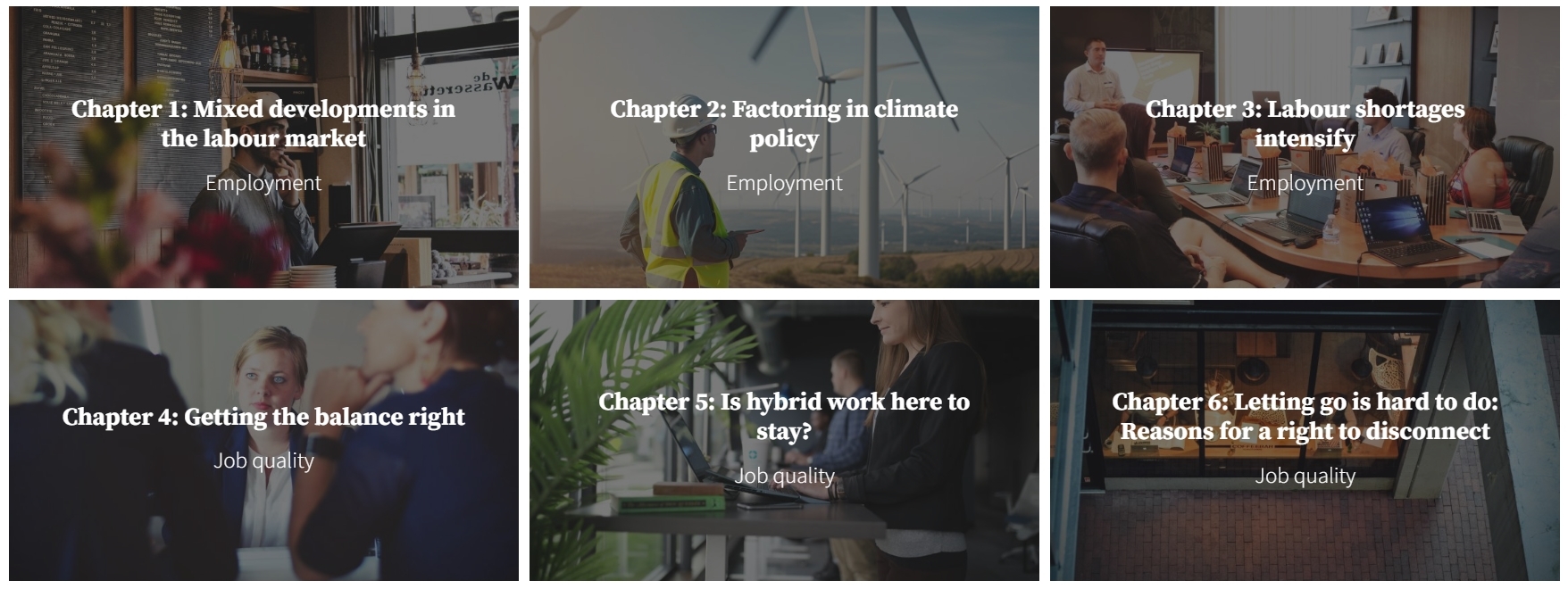


Living and working in Europe 2023 (free e-book)

Twenty twenty-three was a good year to be working in Europe in many respects, with over three-quarters of working-age Europeans in employment, unemployment at a record low and the economy continuing to create, for the most part, well-paid jobs. The verdict on living in Europe during the year was, however, more nuanced, with benefits of high employment not translating into clear improvements in the lives of Europeans. In large part this was due to the continued rise in the cost of living with access to affordable and adequate housing remaining unattainable for many.
Read more in our digital story and dip into or download the 2023 Eurofound yearbook.

Foreword
In many respects, 2023 was a good year to be working in Europe. Employment, in particular, was a bright spot. Over three-quarters of working-age Europeans are now in employment. The economy continues to generate employment, for the most part in well-paid jobs. Unemployment dropped to a record low. Gender discrepancies in the labour market are being chipped away as employment grows faster among women than men, narrowing the gender employment gap, albeit at a snail’s pace. Such is the demand for workers that labour shortages are putting a squeeze on business performance. While this is a threat to economic competitiveness, it is also a wake-up call for governments and employers to invest more in work. For years, training and upskilling have been falling behind the accelerating pace of change as digitalisation sweeps through the world of work and the greening economy demands new skills. Governments, businesses and workers need to maintain the impetus of the 2023 European Year of Skills and to internalise a mindset of upskilling and reskilling. Without such a mindset, not only will the current shortages persist, but the green and digital transition could falter.
With more choices in the labour market, more workers are able to turn their backs on undesirable jobs. Many jobs expose workers to a raft of stressors, both physical and psychological. Evidence from Eurofound’s most recent survey on working conditions is that close to one-third of jobs are strained, the harms of which to health and well-being accumulate over time. But the evidence also suggests that reducing strain does not require so much as a workplace revolution as the creation of more supportive work environments that demonstrably value their workers. Beyond workplace measures, the need for workers to be able to disconnect at the end of the working day is receiving increasing recognition at national and EU levels. Pressure for EU regulation is not likely to disappear despite the failure of the EU-level social partners to reach agreement. With 80% of workers in a Eurofound survey saying that they regularly receive out-of-hours contact, it is clear that boundaries need to be set.
The verdict on living in Europe in 2023 is more nuanced. The benefits of high employment are not translating into palpable improvements in the daily lives of all Europeans, in large part due to the continued rise in the cost of living. With earnings from work insufficient to keep pace with inflation, some are forced to forego the staples of a basic standard of living in these prosperous times. And something as fundamental as affordable housing for all Europeans seems to have become an unattainable dream for many. Failure to share in the spoils of a relatively healthy economy contributes to public disillusion and disconnection from the political mainstream. Trust in government and in the EU is low, according to Eurofound findings from 2022, especially among rural populations. Add in other contentious issues such as immigration – fears of which anti-immigration activists have fuelled in the face of political disunity – and there is a real prospect that political alienation will be reflected in the ballots cast in the European Parliament elections of 2024 – at a time when solidarity in Europe was never more critical.
The ongoing war in Ukraine demands a united EU front against an increasingly aggressive Russia. Failure to deliver on the goals of the European Green Deal is not an option, as the record high temperatures of summer 2023 reminded us, and only solidarity of EU leadership within itself and with the citizens of Europe will see the strategy through the complexity and opposition ahead. But the ride will not be easy. 2024 will see a new European Parliament and Commission take over responsibility for the sustainable development of the EU and the advancement of equality and social justice. Eurofound will be at the side of these institutions to deliver the evidence from its sphere of expertise to guide policy on employment, working conditions and quality of life as they evolve in a changing world.



May 8, 2024

The cool kids have the Drake and Kendrick Lamar beef, but the wonks have former Rep. Kevin McCarthy (R-CA) and Rep. Matt Gaetz (R-FL). This political beef goes back months, when Gaetz basically single-handedly set in motion the ouster of McCarthy as Speaker of the House last October. McCarthy resigned from Congress altogether by the end of the calendar year, and he and Gaetz have not been shy about their contempt for each other. In an interview with Politico’s Olivia Beavers published on Wednesday, McCarthy threw down the latest insult against his nemesis, calling him “the Hunter Biden of the Republican party,” referring to the troubled son of President Joe Biden:
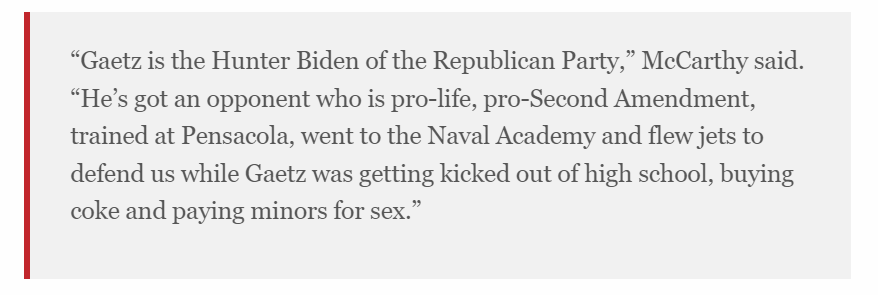
McCarthy is referring to Aaron Dimmock, who stepped in at the zero hour to challenge Gaetz in a primary election for his House seat. Upon hearing the announcement of his new opponent, Gaetz referred to Dimmock as a “puppet” of McCarthy. As for McCarthy’s allegations about Gaetz, the latter has denied ever paying for sex with an underage girl. However, Gaetz also reportedly told his colleagues in Congress that he went on a hunting expedition for McCarthy to kibosh a House Ethics investigation into the allegations. That investigated continued, and in February, a woman “provided a sworn statement to the committee saying she attended a 2017 party Gaetz also attended where illegal drugs were present — as well as a naked underage girl.” And while McCarthy is enjoying post-Congress life, he still has allies in the House. Beavers wrote:
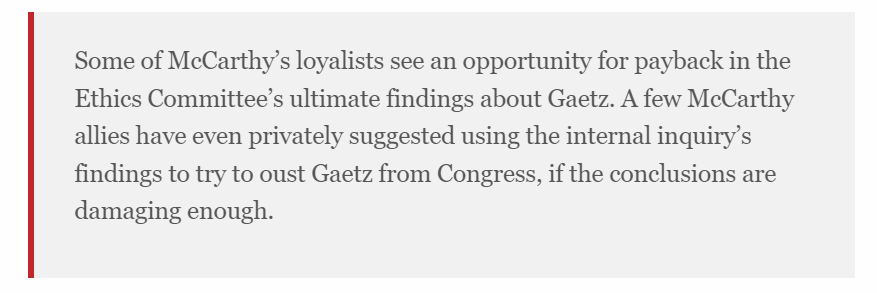
Gaetz also has eight allies, all of whom are up for reelection in November. And McCarthy and his allies are taking their revenge tour right to all of those congressional districts. There is one way for Gaetz to level up: diss track.
snip
McCarthy Slams Gaetz as 'The Hunter Biden' of the GOP: He's 'Buying Coke and Paying Minors for Sex'
https://www.mediaite.com/politics/mccarthy-slams-gaetz-as-the-hunter-biden-of-the-gop-hes-buying-coke-and-paying-minors-for-sex/
The cool kids have the Drake and Kendrick Lamar beef, but the wonks have former Rep. Kevin McCarthy (R-CA) and Rep. Matt Gaetz (R-FL). This political beef goes back months, when Gaetz basically single-handedly set in motion the ouster of McCarthy as Speaker of the House last October. McCarthy resigned from Congress altogether by the end of the calendar year, and he and Gaetz have not been shy about their contempt for each other. In an interview with Politico’s Olivia Beavers published on Wednesday, McCarthy threw down the latest insult against his nemesis, calling him “the Hunter Biden of the Republican party,” referring to the troubled son of President Joe Biden:

McCarthy is referring to Aaron Dimmock, who stepped in at the zero hour to challenge Gaetz in a primary election for his House seat. Upon hearing the announcement of his new opponent, Gaetz referred to Dimmock as a “puppet” of McCarthy. As for McCarthy’s allegations about Gaetz, the latter has denied ever paying for sex with an underage girl. However, Gaetz also reportedly told his colleagues in Congress that he went on a hunting expedition for McCarthy to kibosh a House Ethics investigation into the allegations. That investigated continued, and in February, a woman “provided a sworn statement to the committee saying she attended a 2017 party Gaetz also attended where illegal drugs were present — as well as a naked underage girl.” And while McCarthy is enjoying post-Congress life, he still has allies in the House. Beavers wrote:

Gaetz also has eight allies, all of whom are up for reelection in November. And McCarthy and his allies are taking their revenge tour right to all of those congressional districts. There is one way for Gaetz to level up: diss track.
snip
May 8, 2024
https://slman.com/life/how-to-renovate-a-house
Stockwell House, SW8
MALIN+LYNN were appointed to reimagine a dated four-storey Georgian terraced house in Stockwell, South London.

FLOORING
Decisions about flooring go hand in hand with decisions about the use of the space you are planning to create. If it is a communal area like a hallway, kitchen or bathroom, it is likely to be walked on and potentially damaged by multiple occupants. These areas also attract moisture, so clients tend to look for hardier materials. Most engineered timber flooring is reasonably durable these days. You just need to treat them with care – that means regular cleaning to stop any stains or dirt sitting on the timber for long periods of time. Also bear in mind, pet claws can easily take the top layer and finish of a timber floor away.
Tiles work well in hallways and bathrooms as they are durable and easily cleaned. Just think about the grout lines between individual tiles, which can stain and pick up dirt or moisture easily. We try to reduce the grout line thickness in hallways where dirty shoes are present, source larger-format tiles, or use a darker grout. Bathrooms are cleaner areas by nature, so standard grout lines are fine, though we would still recommend avoiding mosaic tiles (particular on the floors) to save on cleaning.

In entrance hallways, carpets will get damaged much faster than a more solid, less absorbent material. On upper-floor landings, where shoes are not generally worn, durable finishes such as sisal work well. Bear in mind, if underfloor heating is used (see below), the underlay and the carpet itself will need to let the heat through.
Poured concrete is more expensive than the options above, but it has been popular for years now. It’s very practical for large, open-plan floorplates – for example, where kitchen, living and dining areas are all in one space. Just be aware, we’ve seen and heard many horror stories where the concrete has lacked elasticity and cracked within months of installation. This has often been where underfloor heating is present – the temperatures changes can cause the concrete to expand, contract and crack. Expansion joints and concrete with an elastic supplement can help prevent this, or you could use a micro-cement such as Forcrete that gives the look of concrete with less risk of cracking.
ROOFING.................
snip













9 Things To Consider Before You Start A Renovation
A renovation project is a rare chance to reconfigure your home once and for all. According to architects Chelsie Malin and Peter Lynn of Malin + Lynn, the key to getting it right is planning ahead. So you don’t miss a trick, they gave us nine elements – from space-saving joinery to alternative heating systems – that should always be considered at the planning stage, but sometimes get missed…https://slman.com/life/how-to-renovate-a-house
Stockwell House, SW8
MALIN+LYNN were appointed to reimagine a dated four-storey Georgian terraced house in Stockwell, South London.

FLOORING
Decisions about flooring go hand in hand with decisions about the use of the space you are planning to create. If it is a communal area like a hallway, kitchen or bathroom, it is likely to be walked on and potentially damaged by multiple occupants. These areas also attract moisture, so clients tend to look for hardier materials. Most engineered timber flooring is reasonably durable these days. You just need to treat them with care – that means regular cleaning to stop any stains or dirt sitting on the timber for long periods of time. Also bear in mind, pet claws can easily take the top layer and finish of a timber floor away.
Tiles work well in hallways and bathrooms as they are durable and easily cleaned. Just think about the grout lines between individual tiles, which can stain and pick up dirt or moisture easily. We try to reduce the grout line thickness in hallways where dirty shoes are present, source larger-format tiles, or use a darker grout. Bathrooms are cleaner areas by nature, so standard grout lines are fine, though we would still recommend avoiding mosaic tiles (particular on the floors) to save on cleaning.

In entrance hallways, carpets will get damaged much faster than a more solid, less absorbent material. On upper-floor landings, where shoes are not generally worn, durable finishes such as sisal work well. Bear in mind, if underfloor heating is used (see below), the underlay and the carpet itself will need to let the heat through.
Poured concrete is more expensive than the options above, but it has been popular for years now. It’s very practical for large, open-plan floorplates – for example, where kitchen, living and dining areas are all in one space. Just be aware, we’ve seen and heard many horror stories where the concrete has lacked elasticity and cracked within months of installation. This has often been where underfloor heating is present – the temperatures changes can cause the concrete to expand, contract and crack. Expansion joints and concrete with an elastic supplement can help prevent this, or you could use a micro-cement such as Forcrete that gives the look of concrete with less risk of cracking.
ROOFING.................
snip













May 8, 2024
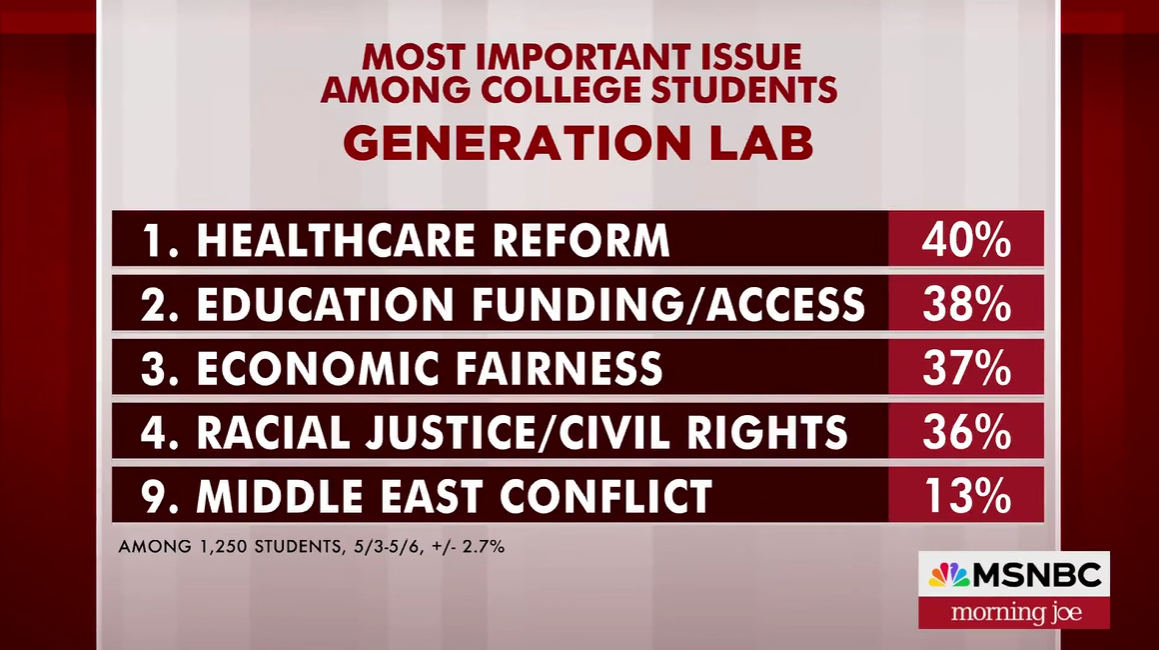
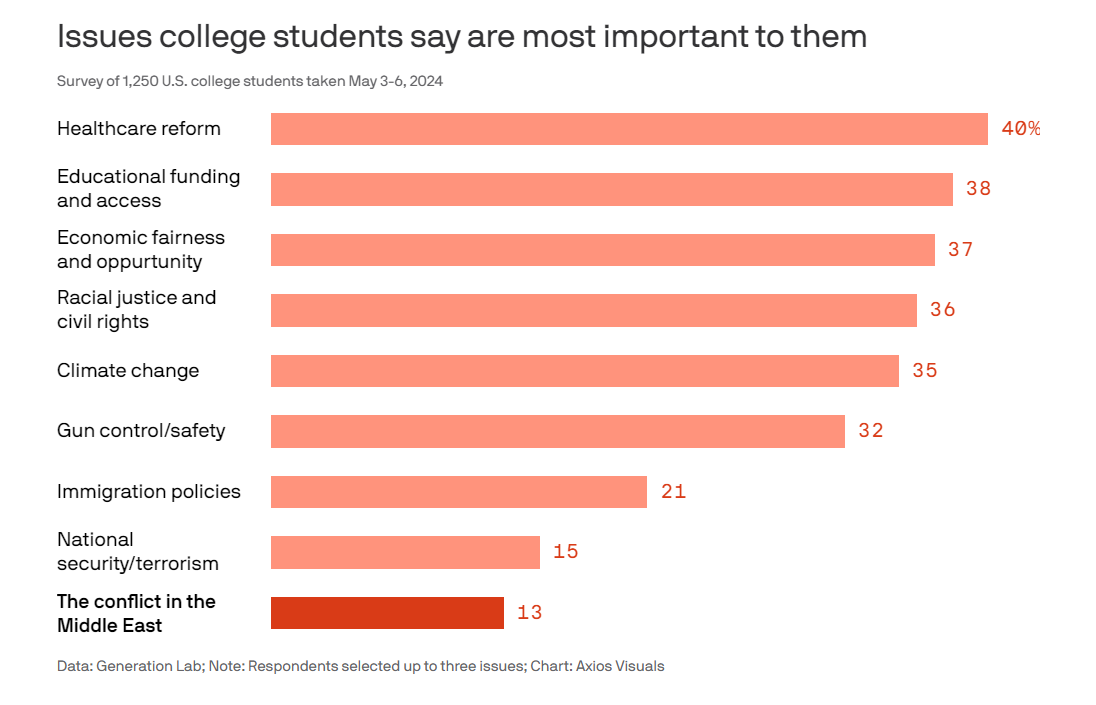
New poll reveals surprising student sentiments amid campus protests (Morning Joe video cut)


May 8, 2024




https://www.washingtonpost.com/opinions/2024/05/05/abortion-biden-politics-life/
https://archive.ph/oV4hu
It must be challenging for a Catholic president to make abortion the centerpiece of his reelection campaign. I wonder whether Joe Biden has nightmares as he recruits abortion-denied women to serve as surrogates to make his case. Once a proud pro-life Democrat, Biden has become a modern-day gladiator for abortion, even if he can’t bring himself to say the word. During his State of the Union address in March, the president all but danced an Irish jig around the term, speaking instead of protecting reproductive freedom. His discomfort was telling.
Later, during a campaign visit to Florida, Biden crossed himself as he was being introduced by a woman who was denouncing Gov. Ron DeSantis (R) for his decision to stop abortions at six weeks instead of the previous 15 weeks. It was a moment. Reactions ricocheted around social media, with some fellow Catholics seeing his gesture as sacrilegious. What I saw was a Catholic pleading for forgiveness for delivering a message he secretly finds abhorrent.
This is, of course, between him and his maker, but my guess is Biden realizes he has made a bargain with the wrong guy and must atone however he can — except, of course, by being true to his convictions and, at 82, sacrificing his (fourth) bid for the presidency in the service of his faith. Biden can’t make his Catholicism part of his campaign, frequently telling people he always keeps a rosary in his pocket and then expect not to be critiqued when he betrays that faith.
Among Biden’s recruits is the now-famous Amanda Zurawski, the lead plaintiff in a lawsuit against Texas seeking clarity on the state’s three overlapping abortion laws. The confusion has been cleared up in nonpartisan state legislation, but not in time to help Zurawski and 19 other women who have joined the suit. Zurawski’s horrific experience during a doomed pregnancy is a textbook case of what can go wrong when legislators think they know better than doctors about medical science. Zurawski was 18 weeks pregnant when her water broke, an event that puts the mother at great risk of infection.
snip
WaPo's Kathleen Parker goes off the deep end: 'Biden's abortion push reeks of desperation'


https://www.washingtonpost.com/opinions/2024/05/05/abortion-biden-politics-life/
https://archive.ph/oV4hu
It must be challenging for a Catholic president to make abortion the centerpiece of his reelection campaign. I wonder whether Joe Biden has nightmares as he recruits abortion-denied women to serve as surrogates to make his case. Once a proud pro-life Democrat, Biden has become a modern-day gladiator for abortion, even if he can’t bring himself to say the word. During his State of the Union address in March, the president all but danced an Irish jig around the term, speaking instead of protecting reproductive freedom. His discomfort was telling.
Later, during a campaign visit to Florida, Biden crossed himself as he was being introduced by a woman who was denouncing Gov. Ron DeSantis (R) for his decision to stop abortions at six weeks instead of the previous 15 weeks. It was a moment. Reactions ricocheted around social media, with some fellow Catholics seeing his gesture as sacrilegious. What I saw was a Catholic pleading for forgiveness for delivering a message he secretly finds abhorrent.
This is, of course, between him and his maker, but my guess is Biden realizes he has made a bargain with the wrong guy and must atone however he can — except, of course, by being true to his convictions and, at 82, sacrificing his (fourth) bid for the presidency in the service of his faith. Biden can’t make his Catholicism part of his campaign, frequently telling people he always keeps a rosary in his pocket and then expect not to be critiqued when he betrays that faith.
Among Biden’s recruits is the now-famous Amanda Zurawski, the lead plaintiff in a lawsuit against Texas seeking clarity on the state’s three overlapping abortion laws. The confusion has been cleared up in nonpartisan state legislation, but not in time to help Zurawski and 19 other women who have joined the suit. Zurawski’s horrific experience during a doomed pregnancy is a textbook case of what can go wrong when legislators think they know better than doctors about medical science. Zurawski was 18 weeks pregnant when her water broke, an event that puts the mother at great risk of infection.
snip
May 8, 2024

Glittering Kremlin inauguration boycotted by Britain, US and most EU countries — but not France
https://www.thetimes.co.uk/article/putin-sworn-russian-president-term-inauguration-2024-bpmnn7srj
https://archive.ph/xCbMm

President Putin was sworn in for a fifth term at a glittering ceremony at the Kremlin on Tuesday, shortly after the widow of Alexei Navalny, the late opposition leader, described him as “a liar, a thief and a murderer”. The opulent inauguration at the gilded Grand Kremlin Palace was boycotted by Britain, the United States and most European Union countries over the war in Ukraine, which is in its third year. “We are a united and great nation, and together we will overcome all obstacles, realise everything we have planned, and together we will win,” Putin, 71, said after swearing the presidential oath on the constitution.
Putin has been in power for 24 years and will become Russia’s longest-serving leader since the 18th century, overtaking Joseph Stalin, if he sees out his new six-year term. The constitution was rewritten by the Kremlin in 2020 to extend the limits of his potential term. Putin now has the right to remain in office until May 2036, when he will be 83.

An installation depicting President Putin stands in front of the Peace Palace in the Hague as protesters call for him to go to jail on the day of his swearing-in for a new six-year term PIROSCHKA VAN DE WOUW/REUTERS
It came a day after Moscow announced it was holding drills to rehearse the deployment of tactical nuclear weapons, and threatened to target British military facilities and equipment in Ukraine and elsewhere. President Macron of France had told the Economist it was possible that Nato troops could be sent to Ukraine. Lord Cameron of Chipping Norton, the foreign secretary, said that Britain would not object if Kyiv used British missiles to strike targets inside Russia.
“They are talking about the readiness and even the intention of sending armed contingents to Ukraine — that is, in fact, to put Nato soldiers in front of the Russian military,” Dmitry Peskov, the Kremlin spokesman, said. “This is a completely new round of escalating tensions. It is unprecedented and requires special measures.” Shortly before the ceremony, Yulia Navalnaya, 47, whose husband, Alexei, died suddenly in an Arctic prison in February, urged Russians to fight Putin’s regime. “Our country is being led by a liar, a thief and a murderer, but this will definitely come to an end. Don’t give up, truth will prevail,” Navalnaya said in a video.

“With each of [Putin’s] terms, everything only gets worse, and it is frightening to imagine what else will happen while Putin remains in power. Huge sums of money are stolen from all of us every day to fund bombings of peaceful cities, riot police beating people with batons, propagandists spreading lies. And also for [the elite’s] own palaces, yachts and private jets,” Navalnaya said.
snip

The American actor Steven Seagal was a guest ALEXANDER NEMENOV/AFP

Putin sworn in as Russian president for a fifth term

Glittering Kremlin inauguration boycotted by Britain, US and most EU countries — but not France
https://www.thetimes.co.uk/article/putin-sworn-russian-president-term-inauguration-2024-bpmnn7srj
https://archive.ph/xCbMm

President Putin was sworn in for a fifth term at a glittering ceremony at the Kremlin on Tuesday, shortly after the widow of Alexei Navalny, the late opposition leader, described him as “a liar, a thief and a murderer”. The opulent inauguration at the gilded Grand Kremlin Palace was boycotted by Britain, the United States and most European Union countries over the war in Ukraine, which is in its third year. “We are a united and great nation, and together we will overcome all obstacles, realise everything we have planned, and together we will win,” Putin, 71, said after swearing the presidential oath on the constitution.
Putin has been in power for 24 years and will become Russia’s longest-serving leader since the 18th century, overtaking Joseph Stalin, if he sees out his new six-year term. The constitution was rewritten by the Kremlin in 2020 to extend the limits of his potential term. Putin now has the right to remain in office until May 2036, when he will be 83.

An installation depicting President Putin stands in front of the Peace Palace in the Hague as protesters call for him to go to jail on the day of his swearing-in for a new six-year term PIROSCHKA VAN DE WOUW/REUTERS
It came a day after Moscow announced it was holding drills to rehearse the deployment of tactical nuclear weapons, and threatened to target British military facilities and equipment in Ukraine and elsewhere. President Macron of France had told the Economist it was possible that Nato troops could be sent to Ukraine. Lord Cameron of Chipping Norton, the foreign secretary, said that Britain would not object if Kyiv used British missiles to strike targets inside Russia.
“They are talking about the readiness and even the intention of sending armed contingents to Ukraine — that is, in fact, to put Nato soldiers in front of the Russian military,” Dmitry Peskov, the Kremlin spokesman, said. “This is a completely new round of escalating tensions. It is unprecedented and requires special measures.” Shortly before the ceremony, Yulia Navalnaya, 47, whose husband, Alexei, died suddenly in an Arctic prison in February, urged Russians to fight Putin’s regime. “Our country is being led by a liar, a thief and a murderer, but this will definitely come to an end. Don’t give up, truth will prevail,” Navalnaya said in a video.

“With each of [Putin’s] terms, everything only gets worse, and it is frightening to imagine what else will happen while Putin remains in power. Huge sums of money are stolen from all of us every day to fund bombings of peaceful cities, riot police beating people with batons, propagandists spreading lies. And also for [the elite’s] own palaces, yachts and private jets,” Navalnaya said.
snip

The American actor Steven Seagal was a guest ALEXANDER NEMENOV/AFP

May 8, 2024

The Russian president, Vladimir Putin, says he agrees with Vladimir Lenin except on ‘self-determination’. That includes propaganda.
https://www.socialeurope.eu/russia-disinformation-and-europes-battle-for-truth

The Belgian prime minister, Alexander De Croo, co-wrote a letter to fellow European leaders with his Czech counterpart last month, calling for a regime ‘to counter Russian malign activities’ (European Union)
At the end of last month the European Commission launched investigations into Facebook and Instagram—both part of Mark Zuckerberg’s Meta—over their handling of disinformation stemming from foreign countries, particularly Russia. The move comes amid concerns about Russian interference ahead of the European Parliament elections in June. The commission suspects the platforms of failing to limit the spread of falsehoods and co-ordinated foreign manipulation, potentially violating the Digital Services Act. Meta is accused of not adequately controlling deceptive advertisements, disinformation campaigns and co-ordinated bot farms. This investigation marks the fourth under the DSA, following actions against TikTok and other platforms.
Sophisticated campaigns
On March 2nd 2022, the European Union imposed sanctions on several Russian media outlets and holdings—including NTV, Rossiya 1, RT, Sputnik, National Media Group and VGTRK—suspending their transmission and broadcasting within the EU following the full-scale invasion of Ukraine. The EU justified these as necessary to protect public order and security: this was not censorship, it said, but comprised targeted measures consistent with fundamental rights and freedoms. The legal basis was in the Treaty on European Union (article 29) and the Treaty on the Functioning of the European Union (article 215), laying out the general framework for EU sanctions.
Numerous reports and analyses indicate that Russian entities, including state-sponsored actors, have indeed been involved in spreading disinformation. This has been observed not only in the context of the war with Ukraine but also in other geopolitical situations and in attempts to influence elections and public opinion in various countries. The Russian government has been accused of operating sophisticated campaigns aimed at shaping narratives, sowing discord and undermining trust in democratic institutions. These often involve the use of ‘social media’ platforms, fake news websites and other online channels to spread false or distorted information and conspiracy theories.
These tactics are often employed in combination to create campaigns aimed at achieving strategic objectives, such as weakening the EU’s cohesion, undermining trust in institutions and advancing Russia’s geopolitical interests.
Rebutting the attacks.............................
snip
Russia, disinformation and Europe's battle for truth

The Russian president, Vladimir Putin, says he agrees with Vladimir Lenin except on ‘self-determination’. That includes propaganda.
https://www.socialeurope.eu/russia-disinformation-and-europes-battle-for-truth

The Belgian prime minister, Alexander De Croo, co-wrote a letter to fellow European leaders with his Czech counterpart last month, calling for a regime ‘to counter Russian malign activities’ (European Union)
At the end of last month the European Commission launched investigations into Facebook and Instagram—both part of Mark Zuckerberg’s Meta—over their handling of disinformation stemming from foreign countries, particularly Russia. The move comes amid concerns about Russian interference ahead of the European Parliament elections in June. The commission suspects the platforms of failing to limit the spread of falsehoods and co-ordinated foreign manipulation, potentially violating the Digital Services Act. Meta is accused of not adequately controlling deceptive advertisements, disinformation campaigns and co-ordinated bot farms. This investigation marks the fourth under the DSA, following actions against TikTok and other platforms.
Sophisticated campaigns
On March 2nd 2022, the European Union imposed sanctions on several Russian media outlets and holdings—including NTV, Rossiya 1, RT, Sputnik, National Media Group and VGTRK—suspending their transmission and broadcasting within the EU following the full-scale invasion of Ukraine. The EU justified these as necessary to protect public order and security: this was not censorship, it said, but comprised targeted measures consistent with fundamental rights and freedoms. The legal basis was in the Treaty on European Union (article 29) and the Treaty on the Functioning of the European Union (article 215), laying out the general framework for EU sanctions.
Numerous reports and analyses indicate that Russian entities, including state-sponsored actors, have indeed been involved in spreading disinformation. This has been observed not only in the context of the war with Ukraine but also in other geopolitical situations and in attempts to influence elections and public opinion in various countries. The Russian government has been accused of operating sophisticated campaigns aimed at shaping narratives, sowing discord and undermining trust in democratic institutions. These often involve the use of ‘social media’ platforms, fake news websites and other online channels to spread false or distorted information and conspiracy theories.
Variety of tactics: Russia employs a variety of tactics to spread disinformation in the EU and beyond. These include:—
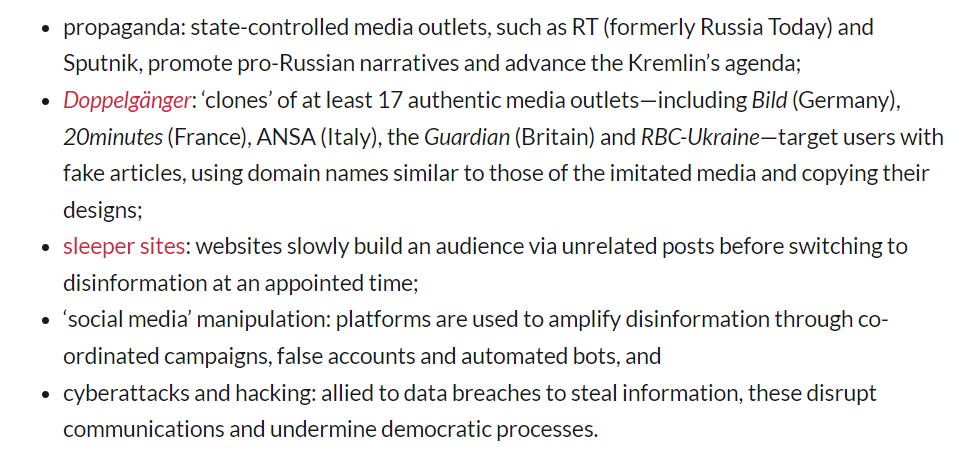

These tactics are often employed in combination to create campaigns aimed at achieving strategic objectives, such as weakening the EU’s cohesion, undermining trust in institutions and advancing Russia’s geopolitical interests.
Rebutting the attacks.............................
snip
Profile Information
Gender: FemaleHometown: London
Home country: US/UK/Sweden
Current location: Stockholm, Sweden
Member since: Sun Jul 1, 2018, 07:25 PM
Number of posts: 43,655
